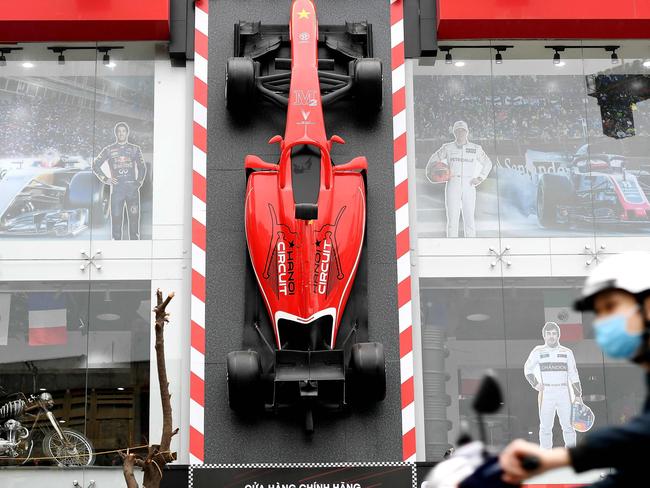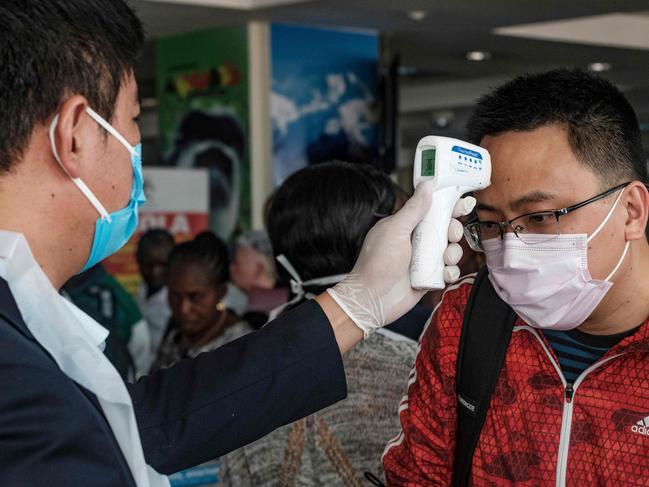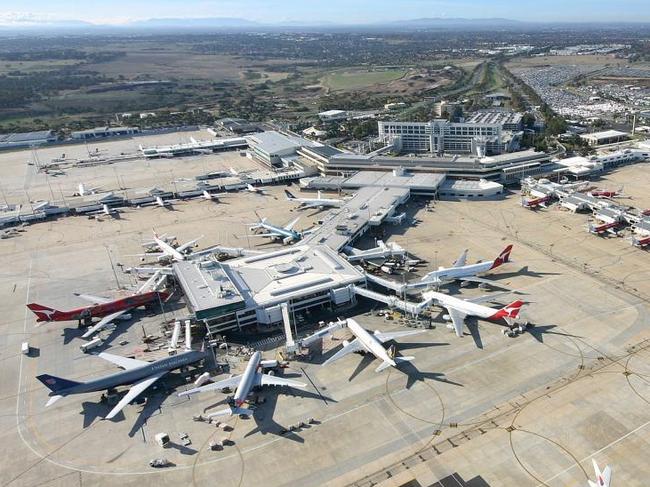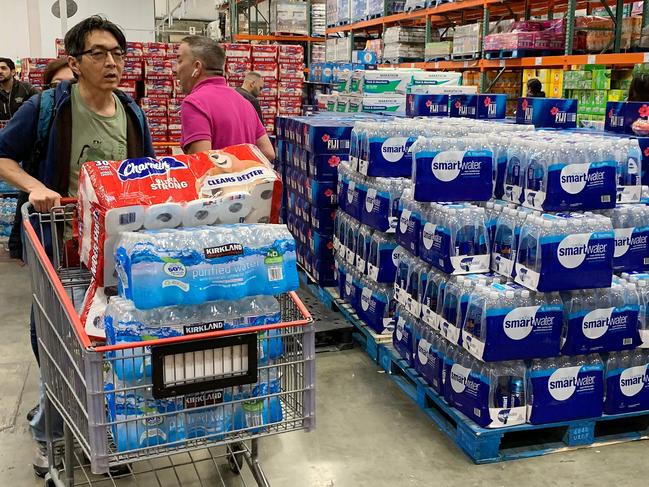Coronavirus mega guide: What you need to know
The World Health Organisation has declared the coronavirus a pandemic. This is what it means and how it affects you and your family.
National
Don't miss out on the headlines from National. Followed categories will be added to My News.
PANDEMICS
What is a pandemic?
The World Health Organisation says a pandemic is a global outbreak of a serious new illness for which people don’t have immunity. Ultimately, it is the WHO that makes the call on when something has become a pandemic.
Why is it now a pandemic?
An outbreak is only declared a pandemic once there is a second wave of infection that includes people who, in the case of the coronavirus, have not travelled to China. The second wave includes person-to-person transmission across other countries over a sustained period. Infections outside China have increased 13-fold in two weeks, WHO’s director-general Tedros Adhanom Ghebreyesus said in that same time, the number of countries impacted has tripled.
How is it different to an epidemic?
An epidemic is a sudden increase in cases or disease that can be unique to a country or community.
What changes now coronavirus is a pandemic?
The short answer is nothing. WHO said that using the word does not change its advice on how countries should respond. It does however stress the importance of countries working together to bring the situation under control.
CATCHING IT
Should I go to the Grand Prix?
Grand Prix organisers say the Australian Grand Prix is going ahead as planned.
Australians have been told its unnecessary to change normal behaviours at this stage.
There has been no official advice to avoid crowds.
Should I stop shaking hands?
This is unnecessary unless you are in contact with high-risk individuals.
Should I stop kissing?
This is unnecessary unless you are in contact with high-risk individuals.
Should I stay away from crowds?
The Prime Minister has said there is not yet a need to cancel mass gatherings.
There are practical measures you can take to protect yourself from the virus, such as keeping at least one metre between yourself and anyone who is coughing or sneezing.

Do I need to wear a face mask?
Generally, no. If you have been directed to self-isolate, or your GP has said you are a suspected or confirmed case, you should wear a mask if you need to leave your home. Healthy people do not need to wear one.
Should I stay away from Chinese restaurants?
No. The Federal Health Minister has encouraged people to be out in the community, while the Chief Medical Officer says there’s no need to change normal behaviours.
How often do I need to use hand sanitiser?
The World Health Organisation recommends washing your hands with sanitiser or soap regularly, such as after coughing or sneezing, using the bathroom, before eating and when caring for the sick.
Is hand sanitiser better than ordinary soap?
No. Ordinary soap is as effective as using sanitiser. However, health authorities urge use of sanitisers that have at least 60 per cent alcohol content.
Should I stay home from university?
Students and staff cannot attend university, higher education or vocational education facility if they have left or transited through mainland China in the past 14 days. It is the same for those who left or transited through Iran on or after March 1, or South Korea on or after March 5.
Anybody who fits into the categories above need to isolate themselves for 14 days and notify their lecturer or tutor of their circumstance to determine whether other arrangements for remote learning could be made.
If a student or staff becomes sick while in isolation they need to keep away from others at home, use a separate bathroom, put a surgical mask on, wash their hands regularly and call a doctor.
At what point should I keep my child home from school?
It is recommended you visit your state or territory’s education and health department’s website for advice, as it can differ slightly. Only one school has been forced to temporarily close as the result of coronavirus so far.
However, if your child has returned or transited through China, South Korea or Iran recently, or have been in close contact with a confirmed case of coronavirus, you must self isolate for 14 days.
Should I stay off public transport?
There has been no official advice to do so.
However, a UK study found people were up to six times more likely to contract an acute respiratory infection if they used public transport during flu outbreaks.
It’s important to remember to wash your hands or use hand sanitiser, and avoid touching your face.

Can pets spread the virus?
There is no evidence that domestic pets can spread the coronavirus at this stage.
However, if you are diagnosed with the virus, it is recommended you avoid contact with pets and other animals.
Can rinsing your nose with saline prevent you from getting coronavirus?
There is no evidence that regularly rinsing your nose with saline protects people from coronavirus infection.
When will Australia hit its peak?
The WA Premier recently pointed to modelling that showed in late April or May, there could be “greater spread” of the coronavirus. He added the peak would “potentially” hit Australia in August.
Will thousands of people in Australia be infected?
A University of Queensland professor recently said that all Australians would eventually catch coronavirus “in the coming months or years” but that for most it would be no worse than a bad cold.

HEALTH
Is coronavirus worse than the ordinary flu?
Seasonal flu generally kills fewer than 1 per cent of those infected, while about 3.4 per cent of reported coronavirus cases have died.
Numbers wise, there have been about 3300 coronavirus deaths. The flu is estimated to kill about 400,000 people each year
I have a cough and a fever. Could I have coronavirus? What are the symptoms?
It’s important to remember that there have been less than 100 confirmed cases in Australia, compared to 80,000 in China. If you feel ill, contact your GP, particularly if you have travelled from areas affected by the coronavirus.
Symptoms include fever, shortness of breath, coughing and sore throat.
How sick do people really get with coronavirus?
Among 44,000 Chinese patients, most experienced mild illness such as fever and a dry cough. Less than 15 per cent had a severe form of infection and 5 per cent were critically ill.
I am really sick but I don’t want to waste anyone’s time, do I really need to be tested for coronavirus?
It is essential you see your GP if you are feeling ill. Signs of coronavirus include severe shortness of breath, high fevers and generalised aching.
My kids are scared of catching coronavirus. How should I explain it to them?
Child psychologist Dr Anne McKinnon said panic and dismissing their children’s fears were two of the worst things parents could do.
Ms McKinnon said the best way to help them through their fears was by helping them understand the facts, put the risk into perspective and keep calm.
She said to not constantly discuss the issue as it could alarm the child.
Another top tip for parents for keeping their children calm included showing them basic hygiene, such as washing their hands and not touching their face.
How much notice will we get if a pandemic is declared in Australia?
The Prime Minister said after launching the emergency response plan that the Federal Government was “effectively operating” as though there was a pandemic.
While life is presently business as usual for the population, if things take a serious turn we could see more people working from home and large gatherings cancelled.
Does the flu injection help?
No. The flu vaccine won’t protect you against coronavirus.

If I come into contact with someone with coronavirus, does that mean I will definitely get it?
It is estimated that each infected person could potentially infect another two to four people.
High-risk people, including those who have returned from affected areas or have been in close contact with infected people, should self-isolate and contact their GP.
How long is self-isolation required?
Fourteen days. This applies if you have returned from mainland China or Iran.
It’s also applicable if you’ve returned from South Korea on or after March 5.
It also applies if you have been in close contact with a confirmed coronavirus case.
If you are returning from Italy, you cannot attend work for 14 days if you healthcare or aged care worker.
Does the severity vary case-by-case?
This has not yet been established. Older people and those with underlying health conditions seem to be at greater risk of serious illness.
If you get it once, are you likely to get it again?
There were reports from Japan that a woman had caught the virus a second time. However, experts say it’s still too early to determine whether this is a feature of coronavirus.
Are hand dryers effective in killing the new coronavirus?
No. Hand dryers are not effective in killing COVID-19. To protect yourself against the new coronavirus, you should frequently clean your hands with an alcohol-based hand rub or wash them with soap and water.
Can spraying alcohol or chlorine all over your body kill the new coronavirus?
No. Spraying alcohol or chlorine all over your body will not kill viruses that have already entered your body. Spraying such substances can be harmful.
TRAVEL
What countries am I restricted from travelling to?
Australia has issued a “do not travel” warning to China, Iran and Italy.
Those going to South Korea have been told to reconsider travel. Those going to Japan and Mongolia have been told to exercise a high degree of caution.
The government says to reconsider travel to South Korea overall, and to not travel to the city of Daegu.
It says to “exercise a high degree of caution” in Italy, and to reconsider travel to 10 towns in Lombardy and one in Veneto.
Should I cancel my overseas holiday?
Visit the Smartraveller website to view current travel warnings. You should also contact your travel insurer to check whether you are covered during the coronavirus outbreak.

Can I get a refund?
It is best to confirm with your airline whether you are eligible for a refund if you have travel booked to a country heavily affected by coronavirus, such as China.
However, travel insurers are unlikely to cover you if you want to cancel your trip “out of fear”.
Should I avoid people who have travelled overseas recently?
Only if they have recently travelled to high-risk areas such as China, Iran or South Korea and have not self-isolated for 14 days as per government recommendations.
Should I avoid flying altogether?
A health expert at the International Air Transport Association said the risk of catching viral infections during a flight was “very low” because of surgical-grade air filtration systems.
There has also been no official advice to avoid air travel other than to high-risk countries such as China and South Korea.
What precautions should I take on a plane?
Practical hygiene advice applies to planes too. Cough or sneeze into a tissue or your elbow and regularly clean your hands after with soap or hand sanitiser. Anyone concerned about exposure should also avoid touching their face.
One study by Emroy University also found that a window seat was the safest place to sit during flu season.
What about cruise ships?
Australians with underlying health concerns should reconsider taking an overseas cruise at this time due to COVID-19. If in doubt, consult a medical professional before travelling.
There have been instances of cruise ships being put into quarantine, countries preventing disembarkation of ships or denying entry to ports.
The itineraries of a number of cruise ships have changed. Disruptions to cruise ship itineraries due to COVID-19 can have significant consequences for travellers.
Repatriation from cruise ships affected by COVID-19 should not be relied upon as an option.
If, despite our advice, you proceed with your cruise and you’re concerned about the impact of the COVID-19 outbreak on your plans, check with your travel agent or cruise company and read and subscribe to our travel advisories for your destinations, including transit locations.
The US has also advised cruisers to reconsider getting on a ship.

Someone on my flight was coughing a lot, could I have been exposed to coronavirus?
If you are concerned, you should self-isolate and contact your GP for advice.
It’s estimated that the flu-like symptoms of coronavirus usually appear around five days on average.
Has the virus affected travel prices?
Australians should keep an eye on airfares.
Flight Centre said that while Chinese travellers are in lockdown, some “very attractive deals” may become available.
There’s also a grim outlook for the travel industry, with some predicting the coronavirus outbreak could cost the airline industry $113 billion in lost revenue.
FINANCE
How bad will the economic effects be?
The coronavirus has hit Australia’s tourism and education industries, as well as the Australian dollar.
The Senate economic committee recently heard the bug would cut “at least” 0.5 percentage points from economic growth in the March quarter.
Beyond this, its impact will depend on how quickly it spreads and its disruption to ports.
Which stocks will be most impacted?
Specialist adviser at Envision Financial, Luke Smith, told News Corp the stocks under most pressure would be those in sectors where significant changes may occur or be directly impacted, including travel, education and retail.
“After all most things we sell come from China in some way. Good quality companies are not immune to the impact unfortunately but a long-term view is prudent,” he said.
Should I sell my stocks?
Australians have been warned not to panic-sell shares amid the outbreak. It’s recommended they speak to their financial adviser.

Should I buy shares? What shares?
Specialist adviser at Envision Financial, Luke Smith, said to look for assets that had been “oversold” as a result of the unknown fear or long term impact of coronavirus.
“I would be looking for companies with a strong market share in their relevant sector that could provide a strong return with a long-term view,” Mr Smith said.
He said infrastructure assets could be a good option, as that sector does not generally see the same fluctuations compared to retail and banking.
“For the punters out there travel stocks long term could offer strong value given the falls we have seen over the last two weeks,” he said.
Will we go into recession as a result of coronavirus?
It’s uncertain. The outbreak has been rattling global markets and the local ASX. The Treasurer said the Federal Government is doing “everything possible to strengthen the economy”.
What will the government do?
The Federal Government has promised a stimulus package that has not yet been revealed.
It’s expected to be worth billions of dollars directed at business and jobs, and will be announced “well before” the May budget.
The government said it would not be pursuing a “cash splash” similar to Kevin Rudd’s response to the Global Financial Crisis.

RETAIL
Do I need to stock up on toilet paper?
No. Australia’s Chief Medical Officer said it “probably isn’t a proportionate or sensible thing to do at this time”.
I’m worried that other people are stocking up on toilet paper and I’m not going to be able to get any – could we run out?
Unlikely. Australia’s toilet paper is made locally, not imported. However, the parent company of Sorbent said sustained panic-buying “will be certain to stress supply”.
What foods would be sensible to stockpile?
Experts recommend items including canned goods like vegetables and coffee; grains including pasta and breakfast cereal; UHT milk and medical items such as paracetamol.

Is it a bad time to make big purchases?
It’s no better or worse time to do so. However, Australia’s Chief Medical Officer said “there is no reason” to panic-buy items as the Australian coronavirus outbreak is relatively small.
But ensuring you have a decent supply of some household supplies such as laundry powder, nappies and pantry staples may prevent the need for supermarket visits later.
Is it safe to get packages sent from China?
Yes, it is safe. People receiving packages from China are not at risk of contracting the new coronavirus. From previous analysis, we know coronaviruses do not survive long on objects, such as letters or packages.
What products will there possibly be shortages of?
The Australian Retailers Association said clothing, footwear, household goods, and appliances like fridges and washing machines could be impacted as they are made in China.
Smartphone shortfalls as high as 30 per cent are also predicted amid Chinese factory shutdowns.
Originally published as Coronavirus mega guide: What you need to know


